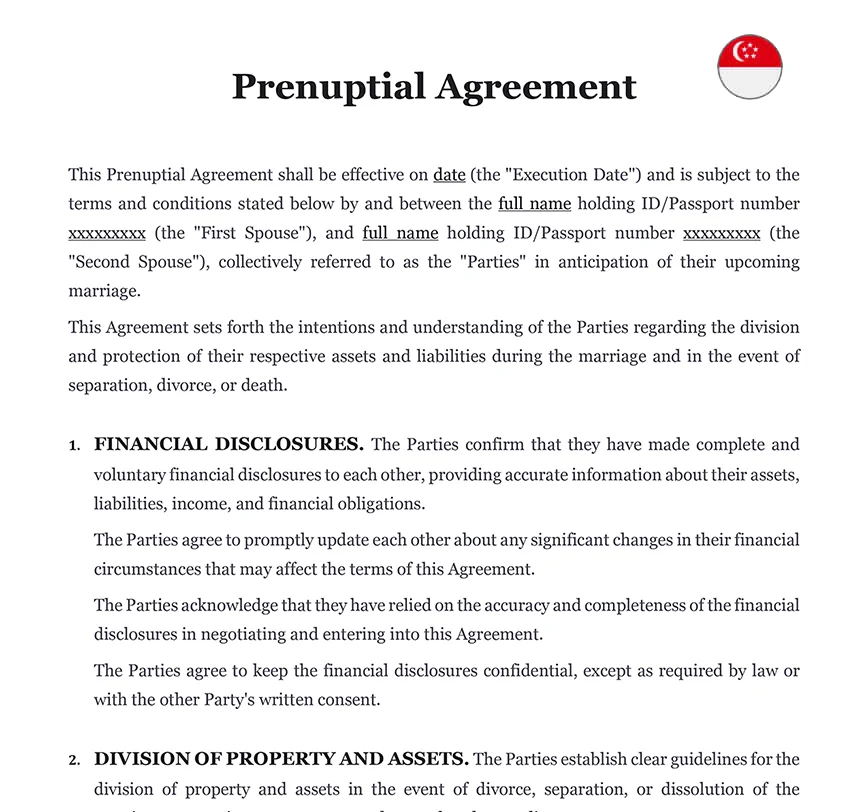Ready to use legal template
Drafted by experienced lawyers
Compliant with Singapore law
Ready to use legal template
Drafted by lawyers
Compliant with Singapore law
Home › Family law › Prenuptial Agreement
Learn more about Prenuptial Agreement in Singapore
A Prenuptial Agreement, commonly known as a prenup, is a legal document that couples in Singapore can enter into before getting married. It outlines the financial and property rights of each spouse in the event of a divorce or separation. Prenuptial Agreements are becoming increasingly popular among couples who wish to protect their assets and rights and clarify the division of property should the marriage end. Themis Partner offers an easy-to-edit legal template for Prenuptial Agreements drafted by experienced lawyers in Singapore, ensuring it complies with the country’s laws and regulations. With this template, couples can customize the agreement to suit their specific needs and provide a sense of security and peace of mind before embarking on their marital journey.
📄 Related documents
Table of contents
What is a Prenuptial Agreement in Singapore?
Is a Prenuptial Agreement legally binding in Singapore?
What does a Prenuptial Agreement include?
Can a Prenuptial Agreement be modified or revoked after marriage?
Do I need a lawyer to draft a Prenuptial Agreement?
Can it cover both financial and non-financial matters?
Are there any restrictions on what can be included?
What is a Prenuptial Agreement in Singapore?
A Prenuptial Agreement, also known as a premarital or prenup agreement, is a legal contract signed by a couple before they get married. In Singapore, it is designed to establish the rights and responsibilities of each party in the event of divorce, separation, or the death of one spouse. The Prenuptial Agreement allows couples to address various financial and property matters, such as asset distribution, alimony, and debt allocation, providing clarity and protection for both parties in case of future uncertainties. It is a valuable tool to safeguard individual assets and avoid potential disputes during a marital breakdown.
Is a Prenuptial Agreement legally binding in Singapore?
Yes, a Prenuptial Agreement is legally binding in Singapore if it meets certain criteria. According to the Women’s Charter, the agreement must be in writing and signed by both parties in the presence of two witnesses. It is essential that both parties enter into the agreement voluntarily and with full understanding of its implications. The Prenuptial Agreement must not be unconscionable, and it should not be against public policy.
ℹ️ It is advisable to use our Prenuptial Agreement template to ensure that your agreement is drafted accurately to be valid and enforceable in Singapore.
What does a Prenuptial Agreement include?
A Prenuptial Agreement typically includes provisions related to the division of assets, liabilities, and financial matters in the event of divorce or separation. Here are the inclusions that this Prenuptial Agreement covers:
1. Asset Division
Details on how assets acquired before and during the marriage will be divided in case of divorce or separation.
2. Property Rights
Specifies the ownership of properties and how they will be treated during the marriage and after separation.
3. Debts and Liabilities
Outlines how debts and liabilities incurred before and during the marriage will be handled.
4. Alimony or Spousal Support
Addresses whether alimony or financial support will be provided to either spouse after divorce.
5. Business Interests
Addresses the handling of business interests or ownership in the event of divorce.
6. Child Custody and Support
If applicable, outlines arrangements for child custody, visitation rights, and child support.
7. Mediation or Dispute Resolution
With Themis Partner’s Marital Agreement, you can ensure your legal document accurately reflects the couple’s intentions and complies with the legal requirements in Singapore.
Can a Prenuptial Agreement be modified or revoked after marriage?
A Prenuptial Agreement can be modified or revoked after marriage in Singapore, but certain conditions must be met. Both parties must agree to any changes, and the modification or revocation should be done in writing, signed by both spouses, and witnessed. It is essential to consult with a family lawyer to ensure that the changes comply with the legal requirements and to understand the potential implications of modifying or revoking the agreement.
- Remarks:
Any modifications or revocations should be properly recorded to ensure their enforceability in case of any future disputes.
Do I need a lawyer to draft a Prenuptial Agreement?
While it is not a legal requirement to have a lawyer draft a Prenuptial Agreement in Singapore, it is highly recommended to seek legal counsel or use our template drafted by legal experts. Prenuptial Agreements involve complex legal considerations, and having a lawyer’s expertise ensures that the agreement is drafted correctly and complies with Singaporean laws.
A qualified family lawyer can help you understand your rights and obligations, provide advice on the best terms to include in the agreement, and ensure that both parties’ interests are protected. They can also ensure that the agreement is fair and enforceable in the event of a divorce or separation.
Using Themis Partner’s Prenuptial Agreement can prevent future disputes and provide peace of mind for both parties, knowing that their interests are adequately represented and protected.
Can it cover both financial and non-financial matters?
A Prenuptial Agreement in Singapore can cover both financial and non-financial matters. While Prenuptial Agreements are often associated with the division of financial assets and spousal support in the event of a divorce, they can also address various non-financial issues. Some common non-financial matters that can be included in a Prenuptial Agreement are:
1. Property and asset division: The agreement can outline how properties and assets acquired before and during the marriage will be divided in case of divorce.
2. Custody and visitation rights: If the couple has children, the agreement can address matters related to child custody, visitation rights, and child support.
3. Inheritance rights: The Prenuptial Agreement can specify how inheritance rights will be affected in the event of a divorce or the death of one spouse.
4. Personal belongings: The agreement can address the division of personal belongings and sentimental items.
5. Debt responsibilities: The Prenuptial Agreement can determine how debts acquired during the marriage will be allocated between the spouses.
6. Living arrangements: It can include provisions about living arrangements and responsibilities during the marriage and after a potential divorce.
It is essential to discuss with a qualified family lawyer to ensure that all relevant financial and non-financial matters are properly addressed in the Prenuptial Agreement to provide comprehensive protection for both parties.
Are there any restrictions on what can be included?
there are certain restrictions on what can be included in a Prenuptial Agreement in Singapore. While Prenuptial Agreements offer flexibility in addressing various financial and non-financial matters, there are some limitations imposed by the law. The following are some common restrictions:
| ➤ Matters against public policy: Any provisions that go against public policy, moral values, or the law will not be enforceable. For example, agreements that attempt to limit child custody or child support may be deemed unenforceable. |
| ➤ Waiving spousal maintenance completely: A Prenuptial Agreement cannot completely waive a spouse's right to maintenance (alimony) in the event of a divorce. A fair and reasonable provision for spousal support should be included. |
| ➤ Child's best interests: While custody arrangements and child support can be addressed in the agreement, the court will always prioritize the best interests of the child, and any provisions that are not in the child's best interests may not be upheld. |
| ➤ Unconscionability: If the terms of the agreement are extremely unfair or one-sided, a court may deem it unconscionable and refuse to enforce it. |
| ➤ Undue influence or coercion: Both parties must enter into the agreement willingly and without any coercion or undue influence. If one party is forced or pressured into signing the agreement, it may be considered invalid. |
| ➤ Incomplete or vague provisions: The agreement should be clear, specific, and complete in its provisions. Ambiguous or unclear terms may lead to disputes and render the agreement unenforceable. |




